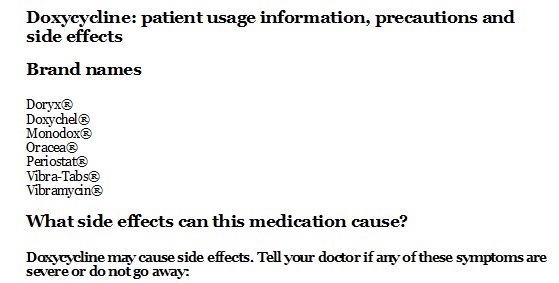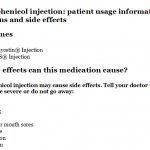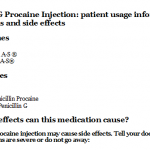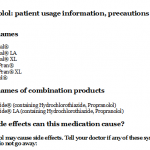
Doxycycline: patient usage information, precautions and side effects
Tuesday, May 23, 2017 by Gregory Van Dyke
http://www.naturalnewsreference.com/2017-05-23-doxycycline-patient-usage-information-precautions-and-side-effects.html

Doxycycline: patient usage information, precautions and side effects
Brand names
Doryx®
Doxychel®
Monodox®
Oracea®
Periostat®
Vibra-Tabs®
Vibramycin®
What side effects can this medication cause?
Doxycycline may cause side effects. Tell your doctor if any of these symptoms are severe or do not go away:
-
diarrhea
-
itching of the rectum or vagina
-
sore mouth
Some side effects can be serious. If you experience any of these symptoms, call your doctor immediately:
-
severe headache
-
blurred vision
-
skin rash
-
hives
-
difficulty breathing or swallowing
-
redness of the skin (sunburn)
-
yellowing of the skin or eyes
-
itching
-
dark-colored urine
-
light-colored bowel movements
-
loss of appetite
-
upset stomach
-
vomiting
-
stomach pain
-
extreme tiredness or weakness
-
confusion
-
decreased urination
Why is this medication prescribed?
Doxycycline is used to treat bacterial infections, including pneumonia and other respiratory tract infections; Lyme disease; acne; infections of skin, genital, and urinary systems. It is also used to treat or prevent anthrax (a serious infection that may be spread on purpose as part of a bioterror attack) in people who may have been exposed to anthrax in the air. It is also used to prevent malaria. Doxycycline is in a class of medications called tetracycline antibiotics. It works by preventing the growth and spread of bacteria. Antibiotics will not work for colds, flu, or other viral infections.
How should this medicine be used?
Doxycycline comes as a regular and a coated capsule, a tablet, a syrup, and a suspension (liquid), all to take by mouth. Doxycycline is usually taken once or twice a day. Drink a full glass of water with each dose of the capsule or tablet. If your stomach becomes upset when you take doxycycline, you may take it with food or milk. However, taking doxycycline with milk or food may decrease the amount of medication absorbed from your stomach. Talk with your doctor or pharmacist about the best way to take doxycycline if your stomach becomes upset. Follow the directions on your prescription label carefully, and ask your doctor or pharmacist to explain any part you do not understand. Take doxycycline exactly as directed. Do not take more or less of it or take it more often than prescribed by your doctor.
Shake the syrup or suspension well before each use to mix the medication evenly.
If you are taking doxycycline for the prevention of malaria, start taking it 1 or 2 days before traveling to an area where there is malaria. Continue taking doxycycline for 4 weeks after leaving the area where there is malaria. You should not take doxycycline for the prevention of malaria for more than 4 months.
Continue to take doxycycline even if you feel well. Take all the medication until you are finished, unless your doctor tells you otherwise.
Other uses for this medicine
Doxycycline may also be used for the treatment of malaria. Talk to your doctor about the possible risks of using this medication for your condition.
This medication is sometimes prescribed for other uses; ask your doctor or pharmacist for more information.
What special precautions should I follow?
Before taking doxycycline,
-
tell your doctor and pharmacist if you are allergic to doxycycline, minocycline, tetracycline, sulfites (for doxycycline syrup only), or any other medications.
-
tell your doctor and pharmacist what prescription and nonprescription medications you are taking, especially antacids, anticoagulants (‘blood thinners’) such as warfarin (Coumadin), carbamazepine (Tegretol), penicillin, phenobarbital, phenytoin (Dilantin), and vitamins. Doxycycline decreases the effectiveness of some oral contraceptives; another form of birth control should be used while taking this drug.
-
be aware that antacids, calcium supplements, iron products, and laxatives containing magnesium interfere with doxycycline, making it less effective. Take doxycycline 1 hour before or 2 hours after antacids (including sodium bicarbonate), calcium supplements, and laxatives containing magnesium. Take doxycycline 2 hours before or 3 hours after iron preparations and vitamin products that contain iron.
-
tell your doctor if you have or have ever had diabetes or kidney or liver disease.
-
tell your doctor if you are pregnant, plan to become pregnant, or are breast-feeding. If you become pregnant while taking doxycycline, call your doctor immediately. Doxycycline can harm the fetus.
-
if you are having surgery, including dental surgery, tell the doctor or dentist that you are taking doxycycline.
-
plan to avoid unnecessary or prolonged exposure to sunlight and to wear protective clothing, sunglasses, and sunscreen. Doxycycline may make your skin sensitive to sunlight.
-
you should know that when you are receiving doxycycline for prevention of malaria, you should also use protective measures such as effective insect repellent, mosquito nets, clothing covering the whole body, and staying in well-screened areas, especially from early nighttime until dawn. Taking doxycycline does not give you full protection against malaria.
-
you should know that when doxycycline is used during pregnancy or in babies or children up to age 8, it can cause the teeth to become permanently stained. Doxycycline should not be used in children under age 8 except for inhalational anthrax or if your doctor decides it is needed.
What special dietary instructions should I follow?
Unless your doctor tells you otherwise, continue your normal diet.
What should I do if I forget a dose?
Take the missed dose as soon as you remember it. However, if it is almost time for the next dose, skip the missed dose and continue your regular dosing schedule. Do not take a double dose to make up for a missed one.
What should I know about storage and disposal of this medication?
Keep this medication in the container it came in, tightly closed, and out of reach of children. Store it at room temperature and away from excess heat and moisture (not in the bathroom).
Unneeded medications should be disposed of in special ways to ensure that pets, children, and other people cannot consume them. However, you should not flush this medication down the toilet. Instead, the best way to dispose of your medication is through a medicine take-back program. Talk to your pharmacist or contact your local garbage/recycling department to learn about take-back programs in your community. See the FDA’s Safe Disposal of Medicines website (http://goo.gl/c4Rm4p) for more information if you do not have access to a take-back program.
In case of emergency/overdose
In case of overdose, call your local poison control center at 1-800-222-1222. If the victim has collapsed or is not breathing, call local emergency services at 911.
What other information should I know?
Keep all appointments with your doctor and laboratory. Your doctor will want to check your response to doxycycline.
Before having any laboratory test, tell your doctor and the laboratory personnel that you are taking doxycycline.
If you have diabetes, doxycycline can cause false results in some tests for sugar in the urine. Check with your doctor before changing your diet or the dosage of your diabetes medicine.
Do not let anyone else take your medication. Your prescription is probably not refillable. If you still have symptoms of infection after you finish the doxycycline, call your doctor.
It is important for you to keep a written list of all of the prescription and nonprescription (over-the-counter) medicines you are taking, as well as any products such as vitamins, minerals, or other dietary supplements. You should bring this list with you each time you visit a doctor or if you are admitted to a hospital. It is also important information to carry with you in case of emergencies.
Why is this medication prescribed?
How should this medicine be used?
What special precautions should I follow?
What special dietary instructions should I follow?
What should I do if I forget a dose?
What side effects can this medication cause?
What should I know about storage and disposal of this medication?
Tagged Under: Tags: chemical medicine, medication, Pharma, Prescription Medicine





